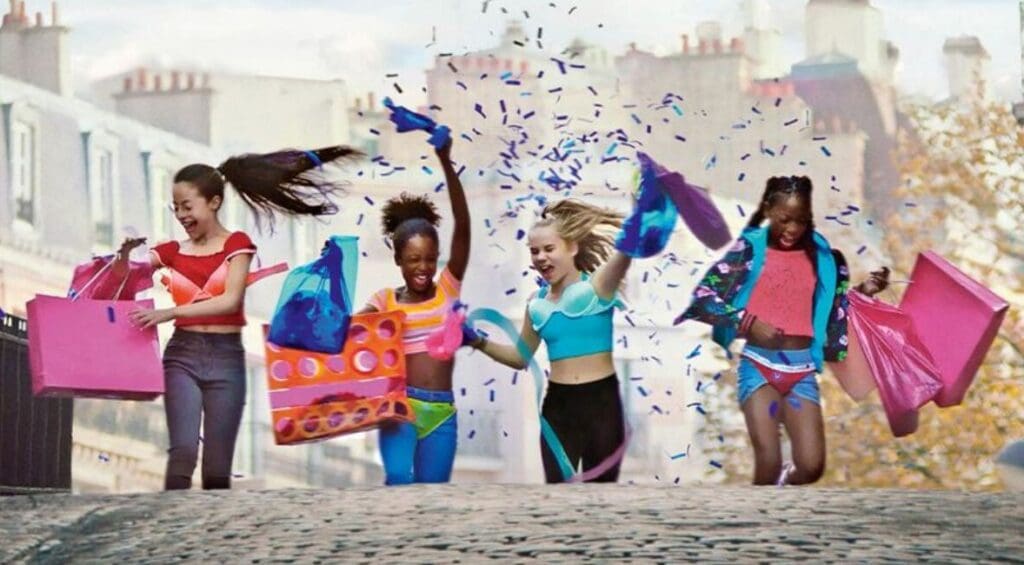Summary
Proving there is such a thing as bad press, Netflix’s Cuties might never recover from its disastrous marketing, despite it being a touching, personal coming-of-age drama.
The furore whipped up around Maïmouna Doucouré’s Sundance darling Cuties was something to behold. Where to begin in unpacking it is anyone’s guess. On the one hand, you have a deeply personal and obviously considered coming-of-age drama from a French-Senegalese director about an 11-year-old Muslim girl who joins a dance group in large part as rebellion against the conservatism of her religion and the ostracization she experiences as an immigrant. On the other hand, you have Netflix, who chose to market that story with a promotional image of pre-teen girls in skimpy outfits and suggestive poses. It was such a phenomenally stupid and short-sighted decision that you can’t help but feel it deserved the immediate, frenzied backlash, which insisted that Netflix was actively sexualizing young girls and that anyone who supported the film was a paedophile. The problem with that response is that the film itself is pretty good and well-worth seeing.
Most of the time it’s pointless trying to argue with anyone on the internet, much less trolls and conspiracy theorists and the other standard types who immediately gravitated towards the controversy as though it was an arrow in the all-seeing eye of heathen Hollywood. But Cuties isn’t a Hollywood film; it’s an observant and well-observed foreign-language curio from a minority filmmaker about a lived minority experience. None of this is to say that Cuties is inured from criticism, just that it requires a more nuanced perspective since it is, itself, built on nuance and not the glossy exploitation that Netflix perplexingly chose to sell it as.
It’s important to understand that the film’s protagonist, Amy (Fathia Youssouf Abdillahi), a Senegalese immigrant living in Paris with her mother and two younger siblings, is in a constant state of suffocating emotional constraint. She is hemmed in not just by her dingy apartment, the master bedroom of which is in the process of being done up for Amy’s father’s second wife, but by the cultural expectations and traditions that lead Amy’s mother to blame herself for her husband’s infidelity. Amy, then, is a prisoner, of her mind, her culture, her status. And all prisoners are inclined to look for the shortest path to freedom.

For Amy, that path does indeed wind through an energetic but inappropriately dressed and styled pre-teen troupe who she’s introduced to by her upstairs neighbour Angelica (Médina El Aidi-Azouni). The “Cuties”, as they call themselves, look their age but try not to act it; an obvious and deliberate artistic choice to emphasize that their behaviour is largely petty rebellion. The film never wants you to forget that these are children. It doesn’t ask you to admire or even necessarily root for them, but to understand they’re looking for somewhere to belong and something to belong to after spending their short lives being told they’re lesser. This is not some kind of sophisticated sub-textual reading – it’s made explicit again and again in how the girls are utterly ignorant of the adult lifestyle they’re pretending to emulate.
The Cuties are an idea. To Amy, they represent the possibility of being unshackled from traditionalism and conservatism. To social media, they, of course, represent something illicit and salacious, ripe for exploitation – it’s a coincidence that Cuties debuts on the same day as Jeff Orlowski’s docu-drama The Social Dilemma, but not an altogether unhappy one, since they peddle similar ideas about the inherently harmful consumption of personally-tailored debauchery that the internet serves up to those young and naïve enough to swallow it. Of course, for Amy, the internet is a gateway to a realm of experience she can’t properly comprehend but intuits is vastly different from her own. The great tragedy of Cuties is in how profoundly she misinterprets the behaviours she perceives as freeing.
There’s also a crushing irony here that makes this film so resistant to the simplistic notion that it’s endorsing one behaviour or condemning another. The fact is that Amy’s experience as a Muslim and as an immigrant is no more or less patriarchal and exploitative than the world of dancing and twerking that she sees as a kind of escapist fantasy. One can’t be traded for the other, but there’d be little point in doing so anyway. It’s a bleak conclusion with a stinging truth to it, and it reinforces the notion that for Amy, growing up, whether it’s too fast or right on schedule, might not ever be enough.



